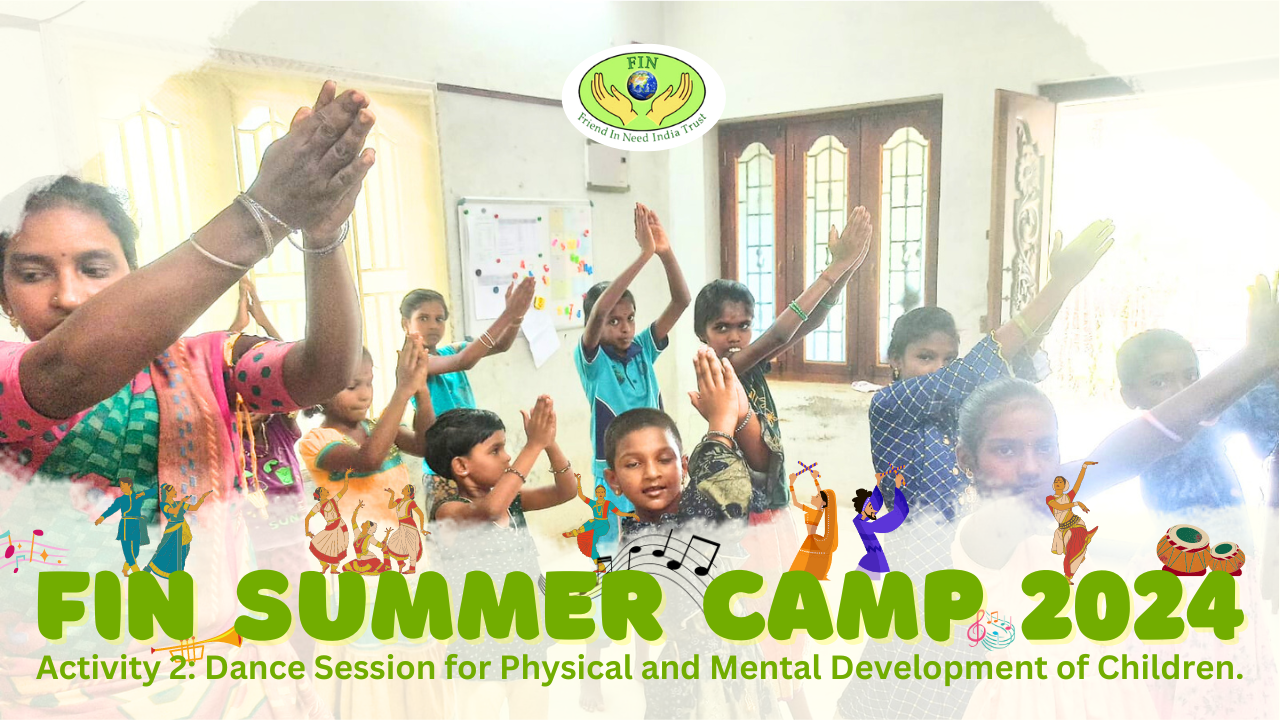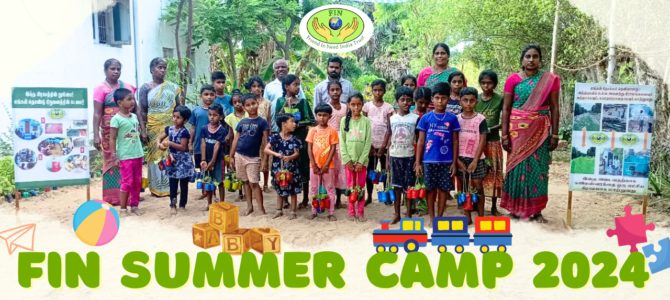In cities as well as in villages, summer vacation is a time for relaxing, but sometimes there is so much free time the children get bored! Then parents worry about children seeing too much TV or playing with the phone and can’t wait for school to restart!
That’s why FIN’s May camp is so popular – with both children and their parents!
Every week a group of children, maximum 20 are registered for a fun day of games, sports, music, dance, handicrafts and spoken English classes in a fun way! There are sessions in the morning and in the afternoon and children can be registered in either. Every session is offered free of cost! Snacks are provided in each session. Children are enrolled in the program on a first come and first served basis. This year 42 children joined for the morning session and 55 for the afternoon session. And what was the most usual remark of the children? “ma’am, why can’t school also be fun like this? “
FIN Summer Camp Activity 1: Game of waste segregation
In the past FIN Trust conducted many surveys, webinars, and research related to waste management and the segregation of biodegradable and non-biodegradable materials. What we found is that people want a clean environment and want to contribute to a clean society but they lag in behaviour and lack knowledge. Behavior has been reinforced by decades of habit which is difficult to change, leading to rampant littering and pollution.
FIN Trust came up with a game to teach waste segregation. We printed photos of biodegradable and non-biodegradable materials and crafted dustbins (red for non-biodegradable and green for biodegradable). The rule is simple, there will be two teams in the match and each team has to take a picture from the referee (FIN Staff in the video below) choose the appropriate dustbin, and drop the picture in it. The team who finishes first will be the winner.
This game not only teaches waste segregation but also helps in behavioral change and can be played individually. Also, we didn’t leave out the adults! Additionally, we hosted webinars and awareness campaigns for the same cause.
FIN Summer Camp Activity 2: Dance Session for Physical and Mental Development of Children.
As far as we can tell, dance has been around all over the world since the most primitive of human civilizations: early cave paintings seem to depict dancing figures as early as 3300 BC. Early on, dance seemed to be used for ceremonial purposes primarily or to communicate stories. Dancing promotes confidence, self-esteem, personal expression, and flexibility of the body and mind.
In our summer camp, we included dance as one of the activities which is headed by our FIN Staff, and children loved and enjoyed so much during dance sessions which is very helpful in the overall physical and mental development of children as follows:-
1. Improves Motor Skills: Dance involves a wide range of movements that help children develop fine and gross motor skills. These movements require coordination, balance, and precision, which enhance overall motor development.
2. Enhances Physical Fitness: Dance is a form of aerobic exercise that improves cardiovascular health, muscular strength, flexibility, and endurance. Regular dancing helps children maintain a healthy weight and build strong bones and muscles.
3. Encourages Posture and Alignment: Dance training emphasizes proper posture and body alignment. Good posture is essential for preventing injuries and ensuring the healthy development of the spine and muscles.
4. Boosts Flexibility: Many dance styles include stretching and bending movements, which increase flexibility. Enhanced flexibility reduces the risk of injuries and contributes to better overall physical health.
5. Supports Brain Development: Dance requires memorization of steps, rhythms, and sequences, which stimulates cognitive development. The connection between movement and rhythm helps develop neural pathways that enhance learning and memory.
6. Fosters Social Skills: Dance often involves group activities, fostering social interaction, teamwork, and communication skills. Children learn to work with others, take turns, and develop a sense of rhythm and timing in a group setting.
7. Reduces Stress: Physical activity, including dance, helps release endorphins, which are natural mood lifters. Dance provides an emotional outlet and can reduce stress and anxiety in children.
8. Encourages Creativity: Dance allows children to express themselves creatively. This creative expression is important for emotional development and can boost self-esteem and confidence.

If you want to make a change and work with us or incorporate our model projects in your locality, then please drop a mail at fintrust.india@gmail.com or contact us at 8709369285
Thank you
FIN India Trust
#FINcamps #FINKameswaram #FINeducation


